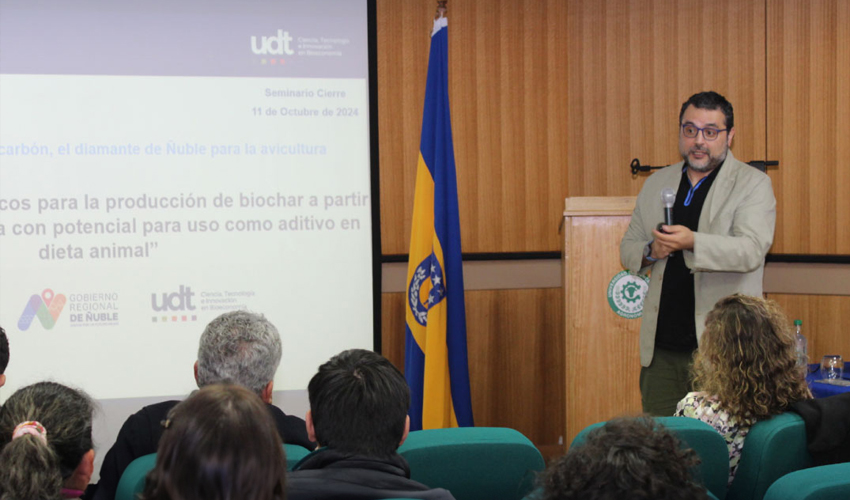The project “Biochar, the Ñuble diamond for Poultry Farming” has had the active participation of the Technological Development Unit (UDT) and the Faculty of Agronomy of the University of Concepción. This initiative has allowed both units to contribute their experience in the research and development of biochar-related technologies, promoting the circular economy in local agroindustry.
This project, financed by the Regional Government of Ñuble through the Innovation Fund for Competitiveness (FIC), ended with a closing seminar. The project was implemented by the Faculty of Agronomy of the Universidad de Concepción, with the main objective of improving production efficiency and reducing the environmental impact of conventional and free-range poultry farms in the region. It also sought to add value to agro-industrial waste through the use of innovative technologies, thus promoting sustainable development and innovation in poultry farming in Ñuble.
Regarding the results, the project director, Dr. Pamela Williams Salinas, director of the Department of Animal Production of Agronomy UdeC, explained: “The results of the project are valuable because they show that biochar, obtained from agro-industrial biomass, can reduce ammonia nitrogen emissions to the environment, in addition to improving productive parameters in laying hens, without affecting the quality of the eggs”.
With an award of almost 180 million pesos from the Innovation Fund for Regional Competitiveness, this project allowed consolidating the poultry unit of the UdeC through the fitting out of spaces and the acquisition of equipment, generating knowledge on dietary additives and agricultural materials that contribute to improve the productivity of the poultry sector and reduce its environmental impact. “The Ñuble region and the UdeC have the necessary infrastructure to generate knowledge in poultry farming, collaborating with both the productive sector and the state sector, which allows improving the competitiveness of the poultry sector, not only in Ñuble, but also nationally and internationally,” said Dr. Williams.
The project also contributed to the formation of human capital, including the participation of undergraduate and master’s degree students, and internships for more than twenty-four students from UdeC’s Agronomy and Veterinary Medicine programs, thus fostering the development of new generations of researchers and professionals in the poultry sector.
During the closing seminar, the main advances of the project were presented. Dr. Mauricio Flores, from the UDT, presented the “Technical background for the production of biochar from agricultural biomass with potential for use as an additive in animal diets”. Dr. Marcelo Doussoulin and Dr. Pamela Williams addressed the “Environmental and productive impact of the use of biochar in confined and cage-free poultry”, and finally, Dr. Marcelo González, from the Faculty of Veterinary Sciences of the UdeC, presented the results on the “Economic valuation of the use of biochar as an additive in poultry”.
After the completion of the project, work will continue on establishing links with poultry and agro-industrial companies, with the aim of building a pyrolysis plant in the Ñuble region, which will allow further development of more sustainable inputs and feeds for poultry farming.
Source: Agronomy UdeC

